
I decided that I sincerely want my debut novel published by St. Martin’s Press, since most of my favorite authors are with them. This is how I came to read Abby Fabiaschi’s debut novel I Liked My Life and I loved it (see my review), so reached out to her to let her know. She is so friendly that I asked her for an interview for my little blogblogblog and she agreed!
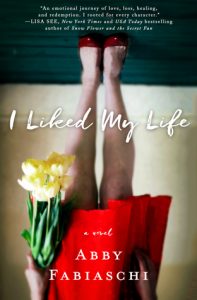
Turns out she’s also an activist for survivors of human trafficking, which is amazing and will be addressed at the end of this interview. She is a survivor herself of a dog attack at a young age, which altered her life and perspective, as you can read below in the Author Extra.
Tell me your artistic / writing process, including schedule, environment, and inspirations.
Motherhood really changed the answer to this question. I use to be able to be much more picky! I put in a minimum of five hours a day—usually 3-4 while the kids are at school and 1-2 after they are asleep (or at least I think they are). I work in a home office at a desk…boring, I know. I’m inspired by whatever it is I’m exploring. I don’t start my stories with an end in mind, so characters’ experiences keep me vested and learning with them.
Walk me through your publishing process, from final draft to final product, including your publishing team.
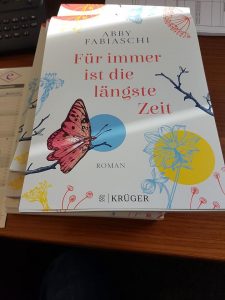
Right now I’m with St. Martin’s. When a first draft is complete, I send it to my agent and editor. They pile on constructive feedback and I make a plan for a round of revisions. That step repeats itself until we all say, “Yep. This works!” St. Martin’s decides on a release date at least a year out and designs a cover. From there, the assigned publicity team works on getting Advanced Reader Copies in the right hands while I get back to work on the next project. About six months before the launch, I get to review the final pass, which is when I add in acknowledgements.
Talk about your support system, including beta readers and all of your cheerleaders!
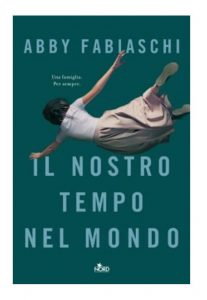
I am in awe of amazing people like you, who bring reading and writing communities together. Since my debut came out, I’ve also been grateful to establish friendships with many talented writers, including all the wonderful authors in The Tall Poppies. (If you are a reader on Facebook, follow Bloom with Tall Poppy Writers—great content and giveaways!)
I don’t have a writing group, nor do I leverage a ton of beta readers. Rather, I approach a couple people who I think would offer a valuable lens on the story to be first readers. There is one exception—my sister is always on the list!
How does life influence your art and vice versa?
Each story I write sets out to explore a component, a strand, of either something I’ve witnessed or experienced. I get a moment in my head and my mind runs with it—what if this and what if that?—until a set of characters have lived through a moment worthy of readers’ time.
What do you love most about your creativity?
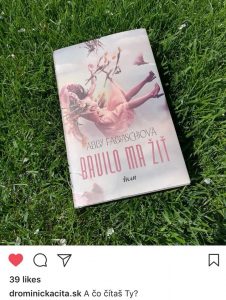
I love how I learn from my characters. With I Liked My Life, I came to believe that even life’s most antagonizing moments offer slivers of beauty once you rise above the fog and the haze of grief. There’s insight and clarity there for the taking. Now, it’s at the expense of whatever you lost and it will never be worth it, so you have to learn to digest the injustice of that. It’s a conclusion I never would have gotten to without diving into the Starling’s story.
Please share about your advocacy activism—I’m all for telling everyone the good you do in the world!
I’d love to! Twenty percent of all of my after tax proceeds go to an organization I co-founded called Empower Her Network. We collaborate with ready survivors of human trafficking who find themselves in the same vulnerable circumstance that led to their initial exploitation by removing housing barriers, financing education, and uncovering employment opportunities. To learn more or buy a Lulu Frost Empowerment bracelet, go to www.empowerhernetwork.org.

Follow Abby
Author Extra: The Inspiration for Abby Fabiaschi’s I Liked My Life
I was attacked by a Rottweiler when I was nine. The last stitch on either side of the wound was inside each eyelid. The dog, aptly named Gator, missed both my eyes by an amount so small as to be immeasurable. The ER doctor heralded this a miracle and I decided, right then, that no matter what I looked like the next day, I would focus on that piece of good fortune—I could still see.
What I didn’t understand in my then-scarred state was that what I would see was about to change. I became a person worthy of double-takes and gasps. I was forced to acknowledge a truth far younger than most; it doesn’t matter what you look like, at least to some. I got fifty-seven stitches that first night and eight reconstructive surgeries over the twelve years that followed, but his is not a sob story. Yes, bone from my rib is now on my nose, and skin from behind my ears and on my ass is now on my face, but I wouldn’t take back that night if I could.
Because here’s the thing—I don’t know who I would be without that experience. Those scars brought me perspective at a young age. They made me tough. They gave me loads of time to read where I could sop up the crazy mistakes people make without experiencing the consequences. They protected me from vanity and made me a keen observer, ultimately leading me to writing.
A friend recently commented that life has thrown enough complications my way to merit a memoir, but an exceptional memoir requires you to hand over the whole of your truth, along with your version of other peoples’ truth, and I’m too territorial for that. Still, I borrow here and there.
When I was fifteen, I lost one of my closest friends in a tragic car accident. I felt tremendous guilt because I hadn’t invited Elizabeth over that day. So stupid—we liked the same boy, so I excluded her. Introducing guilt and grief to my already raging teenage hormones and fierce desire for independence was a hugely defining moment in my life. I Liked My Life started with a desire to explore mourning at that tender age. I wrote it for me, and then went back to my demanding career in high-tech.
Four years later, at fifty-three years-of-age, my dad died of a heart attack. He was my father, but he was also my boss, mentor, and best friend. I didn’t write for years after his death, not even in a journal. The loss consumed all of me.
Then one day, I happened across I Liked My Life on my computer. The title popped from the screen; it felt enormously important to revisit it. Having then mourned as a teenager and a parent, I was better able to distinguish the nuances of grief experienced by each character. Tapping into those challenging life events is where the nonfiction ended and the storytelling began. I was inspired by a sentiment from Adrienne Rich’s poetry; If we could learn to learn from pain even as it grasps us. Isn’t that a powerful thought?
As I discovered after the dog bite, slivers of beauty exist in life’s most antagonizing moments, if only you know where to look. I set out with three characters—Madeline, Eve, and Brady—as they learn exactly that, each on their own timeline and in their own way. I wrote the book for me, unburdening my loss on unsuspecting characters. That their journey will find its way to living and breathing readers is wild.
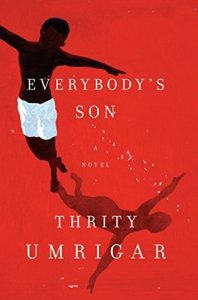 After the death of his son, Judge Coleman uses his influence and connections to foster and adopt 9-year-old African-American Anton, convincing his mother Anton is happier with the Colemans. She’d been kidnapped and drugged by her dealer, leaving Anton locked in their apartment during a heat wave with little food, until he escaped a week later, unaware of his mother’s whereabouts. Judge Coleman’s position and wealth boost Anton up through the ranks of politics, with Anton choosing to have no contact with a mother he believes rejected him. The secrets seep out eventually, damaging the Coleman’s marriage and Anton’s relationships with all of his parents, as Anton desperately tries to determine his identity.
After the death of his son, Judge Coleman uses his influence and connections to foster and adopt 9-year-old African-American Anton, convincing his mother Anton is happier with the Colemans. She’d been kidnapped and drugged by her dealer, leaving Anton locked in their apartment during a heat wave with little food, until he escaped a week later, unaware of his mother’s whereabouts. Judge Coleman’s position and wealth boost Anton up through the ranks of politics, with Anton choosing to have no contact with a mother he believes rejected him. The secrets seep out eventually, damaging the Coleman’s marriage and Anton’s relationships with all of his parents, as Anton desperately tries to determine his identity.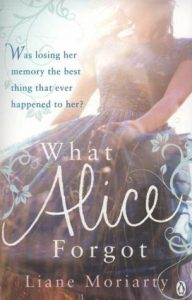 Alice wakes from a daydream of the beach to a painful head in an unfamiliar gym, with a colleague peering down at her. She fell off her bike in spin class and misplaced the last decade in her brain. Current events are not so current, and Alice learns some astonishing facts about the world and popular culture. Over the following week, she discovers some harsh truths about that decade from family, friends, and neighbors. As she slowly gains insight into her own life and troubled relations with her loved ones, the soul searching begins. When the memories hit all at once, Alice is stunned and reasserts herself as she merges her 29-year-old self with her 39-year old self.
Alice wakes from a daydream of the beach to a painful head in an unfamiliar gym, with a colleague peering down at her. She fell off her bike in spin class and misplaced the last decade in her brain. Current events are not so current, and Alice learns some astonishing facts about the world and popular culture. Over the following week, she discovers some harsh truths about that decade from family, friends, and neighbors. As she slowly gains insight into her own life and troubled relations with her loved ones, the soul searching begins. When the memories hit all at once, Alice is stunned and reasserts herself as she merges her 29-year-old self with her 39-year old self.